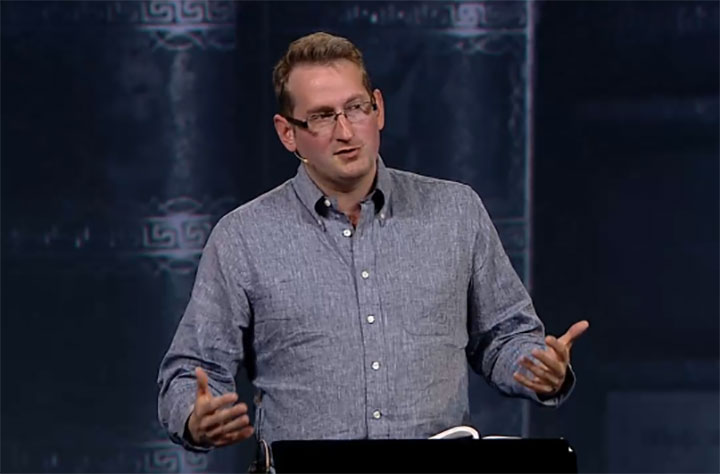Since Old Testament times homosexuality has been an uncontroversial topic among God’s people. It’s sinful. That’s that; no argument, no debate.
However, recent developments in Western society have caused homosexuality to become a hot-button issue in the public arena. In the wake of what Baptist theologian and pundit Albert R. Mohler has labeled “the Moral Revolution,” Stonewall has become Selma. Within a relatively short time, an entirely new category of human rights, “gay rights,” has emerged. People of the same sex are “marrying” with government and even religious recognition. Churches are scrambling to update their by-laws to avoid lawsuits over “same-sex weddings” and employment benefits. High-profile citizens who do not toe the line of sexual acceptance face ostracism in the public square as well as the private sector. Those Christians adhering to long-held biblical standards of sex and sexuality are being labeled as hateful bigots along the lines of the segregationists of the Jim-Crow era. In this unique environment, an entirely new category of Christian celebrity has emerged. Rather than being notable for preaching skill, teaching ability, or academic rigor these new Christian celebrities are being foisted to the forefront of public Christian discourse because of one thing: their dalliances in the homosexual lifestyle.
Emily Thomes

Emily Thomes is perhaps the most theologically-grounded gay Christian celebrity examined in this article. To be clear, Thomes is not gay and does not identify as such. She is a married homemaker and mother and has engaged in formal theological study at Liberty University and Boyce College. Before coming to faith in Christ, Thomes was involved in homosexual relationships as well as drug abuse. She has been featured at several Christian media sources. From time to time, Thomes can be found giving presentations at Christian conferences, speaking almost exclusively about the subject of sexuality. She has also published sexuality-related articles on her personal website. Her most relevant statement there regards identity:
I’ve been very fortunate to be able to share my story with believers and help the church understand homosexuality with a biblical worldview intact; rather than viewing this sin as an identity, we’ve got to see the sin, “practicing homosexuality”, as a fruit of unbelief and treat it and the sinner like we would any other lost person. Those still in the LGBTQ lifestyle have yet to have their sin and their need for a new heart and heart made clear to them. It is my hope that in sharing the things the Lord is teaching me, via articles or other projects, the body of Christ can take away that I wasn’t saved any differently than anyone else who is saved, and that this group of sinners is in need of the same mercy and grace that His church has already been shown.
In a theological milieu where the “same-sex attracted Christian” is being debated as a legitimate category, Thomes’ statement that this sin should not be viewed as an identity stands out. Thomes displays a recognition that God’s grace is greater than any one category of sin. Nevertheless, it’s hard to imagine that Thomes would be anything other than an obscure housewife if not for her personal experience as a homosexual. Clearly, the only reason this woman is invited to speak at conferences and made the subject of Christian journalism is her previous sexuality. While appreciating the kindness God has showed to Thomes, Christians should question the wisdom of foisting a layperson, still relatively young in the faith, into the forefront of a controversial issue.
Rosaria Butterfield

Rosaria Butterfield’s path to Christianity shares some striking parallels to that of Emily Thomes. So, too, does her current life. Butterfield is a wife (married to a Presbyterian minister) and homeschool mother. Before coming to Christ, she was involved in a long-term lesbian relationship. A former tenured professor of English at Syracuse University in New York, Butterfield was ensconced in the world of liberal academia. While researching the theological underpinnings of the religious right, the former critical theorist became convicted of her sin through the reading of scripture. Having come to Christ and out of lesbianism, Butterfield discourages the use of the term “gay Christian.” The former English professor has rightly asserted that “the job of the adjective is to change the noun.” Her positions on Christian sexuality and reaching the lost for Christ can be found in her various published works: The Secret Thoughts of an Unlikely Convert, Openness Unhindered: Further Thoughts of an Unlikely Convert on Sexual Identity and Union with Christ, and The Gospel Comes with a House Key: Practicing Radically Ordinary Hospitality in Our Post-Christian World. In addition to writing books, Butterfield also speaks on the Christian lecture circuit. For example, in 2017, Butterfield was a featured speaker at Josh Buice’s G3 Conference alongside such pastors, missionaries, and theologians as Voddie Baucham, D.A. Carson, Phil Johnson, Paul Washer, and James White.
Why was Butterfield, a secular English teacher from a liberal Roman Catholic background with no formal theological education invited to speak with a lineup of professional ministers? The answer is quite clear. It is because of her background in lesbianism. Like Thomes, Butterfield is famous for her past homosexual experiences and has become a Christian celebrity as a result of her personal experiences with a controversial sin. If not for her lesbianism it is quite possible that, like Thomes, Butterfield would be just another obscure wife and mother (which are wonderful and noble titles and jobs).
Jackie Hill Perry

Jackie Hill Perry is a spoken-word artist signed to the Christian hip hop record label Humble Beast. She is a former “stud lesbian” who transitioned from a homosexual lifestyle to that of a wife and mother. She claims that she was inspired to leave her lesbian lover after God spoke to her saying, “She will be the death of you.” Since that time she has spoken against the sin of lesbianism and affirmed heterosexuality as the only acceptable form of sexual activity. Despite her experiences, Perry has stated that one can come to Christ and still remain a “same sex-attracted” Christian with no desire to have a romantic relationship with a member of the opposite sex.
Despite a dearth of academic or theological credentials, Perry is regularly featured as a speaker by Christian intellectual institutions such as the ERLC and The Gospel Coalition. Both of these organizations are known for their social progressivism and Perry, who is black, is often tapped by them to speak to matters of race, social justice, and sexuality. She is the author of the book Gay Girl ,Good God and shares about her experiences as a lesbian in her published recordings. As is the case with Thomes and Butterfield, Perry is famous in Christian circles for being (formerly) gay. While the content shared by Thomes and Butterfield could be considered “PG-13,” if not family friendly, the vulgarity displayed in Perry’s art is disturbing. Her sexual life as a lesbian is described in graphic, even salacious detail in her poem My Life as a Stud (in fact, it is so graphic I refrain from quoting it or even linking it here). Perry is yet another Christian celebrity famous for her former life of sin. In her case, her vulgarity and progressivism is even more prominently foisted upon the marketplace of Chrisitan ideas as result of her status as a former homosexual, albeit one that still often projects herself in masculine ways.
Sam Allberry

According to his Gospel Coalition profile, Sam Allberry is an “editor for The Gospel Coalition, a global speaker for Ravi Zacharias International Ministries (RZIM), and a pastor based in Maidenhead, UK.” Unlike the individuals previously discussed in this article, Allberry is actually a theologian and credentialed minister, specifically an Anglican priest. What makes Allberry more notable than the hundreds of other Anglican priests in the world who are not editors at the Gospel Coalition and internationally-touring speakers with RZIM is that Allberry identifies as a same-sex attracted Christian. He makes his living not merely as an Anglican minister but also as something of a subject matter expert on Christianity and homosexuality. In his book Is God Anti-Gay,” Allberry shows from the scriptures that homosexual acts are sinful and not acceptable forms of Christian sexual expression (I have not only read this book but have seen Allberry speak in person). However, Allberry maintains that a gay sexual orientation devoid of desire for an opposite sex partner can be normative for the Christian life.
Going against the grammatical advice of Butterfield, Allberry lets the adjective change the noun and identifies as a “same-sex attracted” Christian. Additionally, Allberry is a trustee of an organization called “Living Out” which is dedicated to meeting the needs of same-sex attracted Christians. Included among Living Out‘s online resources is an “audit” document designed to assess a church’s degree of “inclusivity” for Christians who identify as gay. Rather than take a pastoral approach which teaches that Christians can be delivered from homosexuality, Allberry has created a service organization which teaches that a homosexually-oriented Christian life is normative. Despite this controversial tactic, Allberry has risen through the Christian speaking and publishing ranks because he has experience as a gay man.
Takeaways
Christians reading the testimonies of these various “gay Christian” celebrities should take special note that none of them were delivered from sin and to Christ as a result of Christian ministries specifically targeted towards homosexuals. Simply, reading the scriptures was enough to convict them of their sins. Quite frankly, nearly their entire audience (statistically speaking) consists of non-homosexual Christians.
Each of them acknowledges that homosexual sin is no more damning than any other with regards to a life of holiness. Why then have they been promoted to positions of fame, prominence, and influence in the public eye? Are they entertaining oddities? Are they the exhibits of Christian worldview defenders in the court of public opinion? Could it be a little of both?
Whatever the case, it is unwise to give special prominence to any Christian as a result of his or her (former) sin. Yet, this is being done and it’s nothing new. What has been done with these gay Christian celebrities has been done with former cult members, alcoholics, and addicts, people in the testimony business who are adept at telling stories to a crowd to whom their experiences are foreign. The simple fact is that being depraved is the previous state of every Christian. Holding up Christians with certain sin backgrounds, especially new Christians, as examples of the Christian paradigm can set those very Christians up for failures. It can also tempt audiences to overlook a lack of theological acumen or even, in the case of Allberry and Perry, a dangerous doctrinal bent.
As a whole it would be wise to eliminate the celebrity status of all Christians but, in the meantime, let us seek the teaching of those Christians who most faithfully proclaim God’s word rather than those individuals who most disgustingly flaunted it in their former lives.
*Please note that the preceding is my personal opinion. It is not necessarily the opinion of any entity by which I am employed, any church at which I am a member, any church which I attend, or the educational institution at which I am enrolled. Any copyrighted material displayed or referenced is done under the doctrine of fair use.











